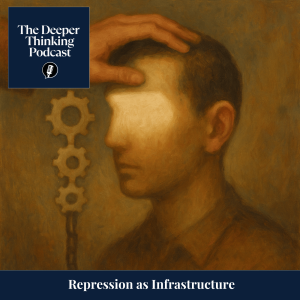
Saturday May 24, 2025
Repression as Infrastructure - The Deeper Thinking Podcast
Repression as Infrastructure
When everything feels permitted, but nothing quite feels free—repression may no longer be psychological, but infrastructural.
Repression is not hidden; it is designed. Not as an accident of the psyche, but as a feature of the system. If repression once belonged to the inner life—some stubborn knot of childhood or dreamwork—then now it belongs to the infrastructures that route our decisions before we know we’ve made them. It is embedded in how choices are presented, how emotions are monetized, how attention is farmed. This is no longer Freud’s domain of latent desire breaking through the cracks. This is repression as supply chain, as operating system, as user interface.
A supermarket shelf represses more than it offers: it offers you infinite choice between brands while repressing the question of why you need fifty versions of the same cereal. A dating app filters desire into swipeable patterns that mask the infrastructural loneliness that made the app necessary. Governance does not tell you no—it lets you say yes to whatever is already allowed. The contemporary subject is not forbidden; they are permitted into submission.
In this light, freedom becomes a performance of options. Repression becomes what structures those options so that they never touch the root. And in this switch from the unconscious to the infrastructural, repression becomes ambient, ergonomic, and invisible. It is felt not in what is denied, but in what is subtly redirected. You don’t even notice the desire fall away—you only feel that everything is somehow available, and somehow hollow.
Freud imagined repression as a psychic mechanism necessary to civilize instinct. But in a system that profits from instinct—where the raw is the sellable and the intimate is the dataset—repression morphs. It is no longer the silencing of the unacceptable but the engineering of what is acceptable in the first place. And so the civilizing function doesn’t suppress—it guides, gently, into paths pre-structured for behavior, belief, and consumption.
The architecture of repression is now algorithmic. It auto-completes not only your sentence, but your desire. The silence is not in your head—it’s in the system. In what the feed does not show you. In what the platform makes impossible to articulate. This is not repression that causes neurosis. It is repression that produces normativity. It teaches you not to ask.
If repression was once the cost of being social, it is now the substrate of sociality itself. The medium is the repression. The governance is the silence. And in this, we do not suffer from too much constraint. We suffer from the illusion of none.
Why Listen?
- Explore how repression has migrated from psyche to interface
- Reframe freedom as something subtly structured by design
- Understand how governance today operates through ambient permission, not prohibition
- Rethink desire in systems that know you too well to let you ask for what you need
Listen On:
Support This Work
Support ongoing production by visiting buymeacoffee.com/thedeeperthinkingpodcast or leaving a review on your podcast platform of choice. Thank you.
Further Reading
- Freud, Sigmund. The Ego and the Id.
- Foucault, Michel. Discipline and Punish – systems of soft control and social conditioning
- Zuboff, Shoshana. The Age of Surveillance Capitalism – repression by personalization
When control feels like compatibility, the most radical act may be to notice what no longer arrives.
#Repression #InterfaceEthics #DigitalGovernance #Neoliberalism #SystemicDesign #Freud #AlgorithmicSociety #TheDeeperThinkingPodcast #PhilosophyOfControl
No comments yet. Be the first to say something!